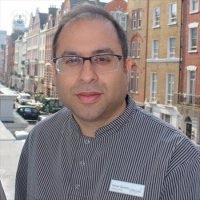Incognito lingual braces: how long will I need them?
Written in association with:Incognito braces do exactly as the name suggests and offer a subtle way in achieving a straighter smile thanks to the brackets and wires being hidden behind your teeth.
There are different types of lingual braces but Incognito are custom-made in a laboratory using detailed scans and impressions of your mouth, which allows the dentist to be very precise in positioning each bracket and wire.
We’ve asked one of our top orthodontists Dr Usman M. Qureshi everything you need to know about the braces, including how long you would need to wear them and if they will affect your speech.

How long do I need lingual braces?
Treatment time in orthodontics depends on the complexity of any patient’s orthodontic treatment plan and is not influenced by any particular type of brace or system.
Mild irregularities can be completed in as little as 7-12 months and more complex treatments can take up to 20-24 months.
Do lingual braces take longer than traditional ones?
There is no difference in treatment time from one appliance to another. Whilst many brace systems have sometimes made claims that their brace or system straightens teeth faster, the independent clinical studies to support these claims are lacking.
The most critical factor that affects treatment time is the complexity of a case and also what our objectives of treatment will be. Many adult patients who have often adapted to their orthodontic problems or bite are prepared to limit the goals of treatment to anterior alignment, which can often be achieved in 7-12 months.
Are they painful or uncomfortable at first?
All braces are associated with some form of discomfort or pain initially and I have been involved in clinical research looking at the pain experiences of adults.
Typically, most patients report that the first three to four days are the most uncomfortable with fixed braces. For lingual patients, this can take longer, especially with lower lingual braces. For this reason, we sometimes consider mixed treatments for our patients with upper lingual braces and lower ceramic braces.
Are they going to affect my speech?
Speech is likely to be disrupted with lingual braces particularly in the first week after fitting. However, almost all patients adapt to the speech difficulty very quickly within one to two weeks after their fitting.
We also find by staging treatment and fitting one arch first, for example, the lower arch, allows the mouth to adapt. It also enables patients to get used to things before we bond the second arch, which really helps our patients to cope with this.
Are there any tips to speed up the treatment?
It is really important to ensure you attend appointments regularly and also ensure that you take care of eating and chewing with your brace. Hard foods can dislodge or break your braces. Keeping breakages down to a minimum can help to reduce the overall length of treatment.
If you would like to discuss your lingual braces options with Dr Qureshi, do not hesitate to book an appointment now.
Ref: Pain experience in adults undergoing treatment: A longitudinal evaluation. Johal A, Ashari AB, Alamiri N, Fleming PS, Qureshi U, Cox S, Pandis N. Angle Orthod. 2018 May;88(3):292-298).



